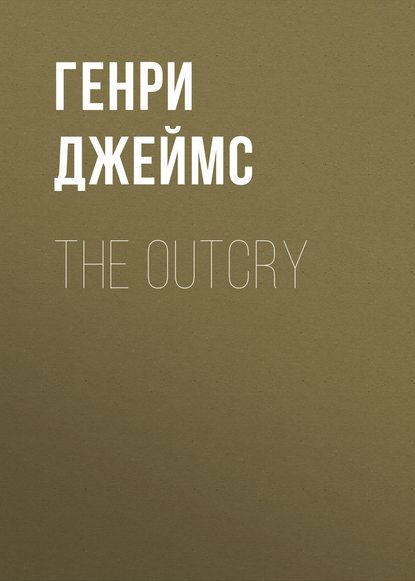По всем вопросам обращайтесь на: info@litportal.ru
(©) 2003-2024.
✖
The Outcry
Автор
Год написания книги
2018
Настройки чтения
Размер шрифта
Высота строк
Поля
“Poor Amy and I are a ladies’ league,” the girl joylessly joked—“as we now take in the ‘Journal’ regardless of expense.”
“Oh then you practically have it all—since,” Hugh, added after a brief hesitation, “I suppose Lord Theign himself doesn’t languish uninformed.”
“At far-off Salsomaggiore—by the papers? No doubt indeed he isn’t spared even the worst,” said Lady Grace—“and no doubt too it’s a drag on his cure.”
Her companion seemed struck with her lack of assurance. “Then you don’t—if I may ask—hear from him?”
“I? Never a word.”
“He doesn’t write?” Hugh allowed himself to insist.
“He doesn’t write. And I don’t write either.”
“And Lady Sandgate?” Hugh once more ventured.
“Doesn’t she write?”
“Doesn’t she hear?” said the young man, treating the other form of the question as a shade evasive.
“I’ve asked her not to tell me,” his friend replied—“that is if he simply holds out.”
“So that as she doesn’t tell you”—Hugh was clear for the inference—“he of course does hold out.” To which he added almost accusingly while his eyes searched her: “But your case is really bad.”
She confessed to it after a moment, but as if vaguely enjoying it. “My case is really bad.”
He had a vividness of impatience and contrition. 197
“And it’s I who—all too blunderingly!—have made it so?”
“I’ve made it so myself,” she said with a high head-shake, “and you, on the contrary—!” But here she checked her emphasis.
“Ah, I’ve so wanted, through our horrid silence, to help you!” And he pressed to get more at the truth. “You’ve so quite fatally displeased him?”
“To the last point—as I tell you. But it’s not to that I refer,” she explained; “it’s to the ground of complaint I’ve given you.” And then as this but left him blank, “It’s time—it was at once time—that you should know,” she pursued; “and yet if it’s hard for me to speak, as you see, it was impossible for me to write. But there it is.” She made her sad and beautiful effort. “The last thing before he left us I let the picture go.”
“You mean—?” But he could only wonder—till, however, it glimmered upon him. “You gave up your protest?”
“I gave up my protest. I told him that—so far as I’m concerned!—he might do as he liked.”
Her poor friend turned pale at the sharp little shock of it; but if his face thus showed the pang of too great a surprise he yet wreathed the convulsion in a gay grimace. “You leave me to struggle alone?”
“I leave you to struggle alone.”
He took it in bewilderingly, but tried again, even to the heroic, for optimism. “Ah well, you decided, I suppose, on some new personal ground.”
“Yes; a reason came up, a reason I hadn’t to that extent looked for and which of a sudden—quickly, before he went—I had somehow to deal with. So to give him my word in the dismal sense I mention was my only way to meet the strain.” She paused; Hugh waited for something further, and “I gave him my word I wouldn’t help you,” she wound up.
He turned it over. “To act in the matter—I see.”
“To act in the matter”—she went through with it—“after the high stand I had taken.”
Still he studied it. “I see—I see. It’s between you and your father.”
“It’s between him and me—yes. An engagement not again to trouble him.”
Hugh, from his face, might have feared a still greater complication; so he made, as he would probably have said, a jolly lot of this. “Ah, that was nice of you. And natural. That’s all right!”
“No”—she spoke from a deeper depth—“it’s altogether wrong. For whatever happens I must now accept it.”
“Well, say you must”—he really declined not to treat it almost as rather a “lark”—“if we can at least go on talking.”
“Ah, we can at least go on talking!” she perversely sighed. “I can say anything I like so long as I don’t say it to him” she almost wailed. But she added with more firmness: “I can still hope—and I can still pray.”
He set free again with a joyous gesture all his confidence. “Well, what more could you do, anyhow? So isn’t that enough?”
It took her a moment to say, and even then she didn’t. “Is it enough for you, Mr. Crimble?”
“What is enough for me”—he could for his part readily name it—“is the harm done you at our last meeting by my irruption; so that if you got his consent to see me–!”
“I didn’t get his consent!”—she had turned away from the searching eyes, but she faced them again to rectify: “I see you against his express command.”
“Ah then thank God I came!”—it was like a bland breath on a feu de joie: he flamed so much higher.
“Thank God you’ve come, yes—for my deplorable exposure.” And to justify her name for it before he could protest, “I offered him here not to see you,” she rigorously explained.
“‘Offered him?”—Hugh did drop for it. “Not to see me—ever again?”
She didn’t falter. “Never again.”
Ah then he understood. “But he wouldn’t let that serve–?”
“Not for the price I put on it.”
“His yielding on the picture?”
“His yielding on the picture.”
Hugh lingered before it all. “Your proposal wasn’t ‘good enough’?”
“It wasn’t good enough.”
“I see,” he repeated—“I see.” But he was in that light again mystified. “Then why are you therefore not free?”
“Because—just after—you came back, and I did see you again!”
Ah, it was all present. “You found you were too sorry for me?”
“I found I was too sorry for you—as he himself found I was.”

















